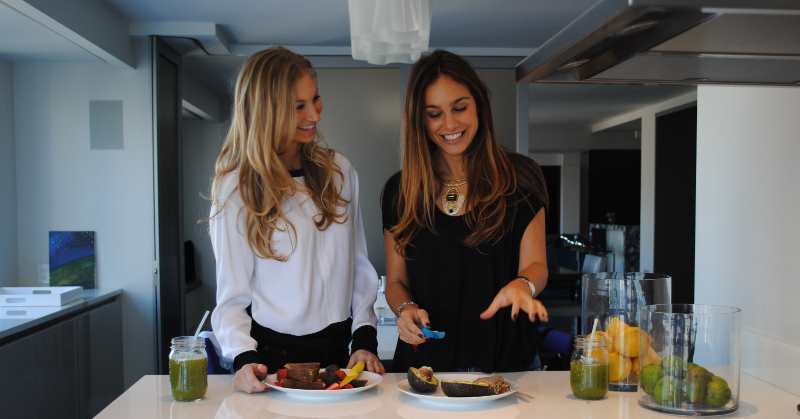Anyone else notice the (serious) connection between a bad night sleep and poor dietary choices? Simply put, lack of sleep = deep exhaustion = give me junk food = can't stop eating. I know you know what I'm talking about.
I feel that many of us are so focused on eating healthy and making good dietary choices, that we forget just how important it is to get enough shuteye. In reality, sleep is a major factor in the health equation and may even dictate what we crave, when we eat, and how much we eat. I decided to bring in the sleep experts from the Tuck Sleep Foundation - a community dedicated to improving sleep hygiene, health, and wellness - to give us a bit more info about the sleep-hunger connection. Here's what they have to say:
Why We Crave Junk Food When We're Sleep Deprived
Sleep deprivation can increase cravings for junk food and binges. It's how you end up in a drive-thru lane late at night, or crave donuts in the morning after a long night.
When you don't get enough sleep, it's especially tempting to binge on junk food. Your impulse control is weakened, and production of the hormones that control feelings of hunger and satiation are altered.
When you're sleep deprived, it's tough to get through everyday life, much less stick to good nutrition habits. But with better sleep, you can adopt a more healthy lifestyle and support yourself as you eat well.
What Sleep Deprivation Does to Hunger Hormones
Sleep deprivation alters the production of hormones that affect hunger and satiation. This can trick your hunger cues and make you feel as if you need to eat more even when you're full.
When you're well rested, your hunger hormones are well regulated and effectively tell your body when you're full, when you should eat, and when you should stop eating. But when you don't get enough sleep, production of these hormones is not regulated properly, and can send cues that encourage overeating and poor food choices.
Ghrelin is the hunger hormone. It's responsible for telling your brain when you're hungry and should eat.
Leptin is the satiety hormone. This hormone tells your brain when you're full and should stop eating.
When you're sleep deprived, production of ghrelin and leptin is unbalanced, with a decrease in leptin production and an increase in ghrelin production. That means your hormones are sending signals to your brain that you are more hungry and less full, which can make you eat more than you should -- maybe even hungry and tired enough to eat junk food you know it's best to avoid.
Sleep and Self Control
While your hormones are sending confusing signals to your brain, your self control is weakened, making it difficult for you to resist junk food cravings when you're sleep deprived.
Sleep deprivation reduces your self control, influencing junk food cravings and poor nutritional choices. And you're less likely to feel energized enough to exercise, so you may not work off extra calories, either.
People who are sleep deprived often struggle with self control, and are more likely to:
Eat bigger portions
Give into cravings for foods rich in fats and carbohydrates
Snack late at night
Consume more calories overall
Drink less water
Consume more carbohydrates and high carb snacks
How to Sleep and Eat Well
When you sleep well, you're better prepared to make good nutritional choices. Your hunger hormones are appropriately regulated so you get the right cues when you're hungry or full, and your self control is stronger, so you're more able to resist the temptation of junk food cravings.
You can improve the quality and quantity of your sleep to support good eating habits with these tips:
Make sleep a priority. You probably have a lot of demands on your time, making it tempting to sleep less and do more. But sleep is the most important thing you can do at night, because it prepares you for a better tomorrow. Plan your schedule so that you have at least eight hours to rest each night, as the average adult needs seven to seven and a half hours of sleep, plus time to fall asleep and wake up.
Create a healthy sleep environment. It's not just the quantity, but quality, of sleep that matters. Eight hours of tossing and turning isn't restful enough to support healthy habits. Make sure your bedroom is a comfortable place to sleep, keeping it dark, cool, and quiet. Choose a mattress that fits your needs for comfort and support.
Maintain healthy sleep habits. Good sleep habits can improve the quality of your sleep as well. Create a regular bedtime schedule, and follow a consistent bedtime routine that will help you feel sleepy and fall asleep more quickly when it's your usual time to go to bed. Take care to avoid habits that can interfere with healthy sleep, such as consuming caffeine or alcohol late at night, eating a heavy meal before bed, or exercising in the hours just before you go to sleep.
Don't stress about missteps. If you struggle to sleep well for a few nights here and there, don't be discouraged. One night isn't enough to make you completely fall off the wagon of healthy sleep. Focus on maintaining healthy sleep habits overall and staying as consistent as possible, even if you slip up now and then.


